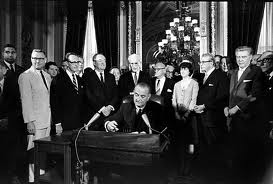Ruling on Section 5 of Voting Rights Act ends need for federal approval of council districts
by Steve Bickerstaff

Today, the United States Supreme Court by a vote of 5-4 effectively struck down Section 5 of the Voting Rights Act of 1965. For Austin, that means that federal approval of the 10 council districts being drawn by the Independent Citizens Redistricting Commission will not be needed.
Technically, the Court left Section 5 in place, but unusable. The Court directly struck down the formula in Section 4(b) of the Act that determined which states and local jurisdictions nationwide were covered by the requirement of Section 5 that changes in election procedures and practices by those covered jurisdictions had to be submitted for preclearance. Section 5 was effectively left dangling inapplicable to any jurisdiction.
Contrary to some preconceptions, the Voting Rights Act of 1965 never actually named certain states or jurisdictions to which Section 5 applied. Instead, the Act established a coverage formula [Section 4(b) of the Act] based on the presence in the jurisdiction in 1964 of a test or device (e.g. literacy tests) limiting voting and a low total voter registration or turnout in the 1964 presidential election. Only certain jurisdictions nationwide were covered by this formula. Other jurisdictions (including Texas) were added in 1970 and 1975 by amendments supplementing the coverage formula, but also tying coverage to circumstances existing when the amendments were adopted.
Today’s opinion for the Supreme Court (written by Chief Justice John Roberts) found that the coverage formula was unconstitutionally outdated. In his opinion, Chief Justice Roberts explained, “Congress could have updated the coverage formula …, but did not do so. Its failure to act leaves us today with no choice but to declare Section 4(b) unconstitutional.”
It is unclear whether the Department of Justice may be more aggressive in the future in trying to utilize other parts of the Act not tied to this coverage formula.
Impact on Austin’s 2014 election
In terms of the City of Austin process for drawing 10 new election districts, which will be achieved through the work of the recently established Independent Citizens Redistricting Commission, there are three identifiable results of today’s ruling:
First, Section 2 of the Voting Rights Act remains in effect nationwide and bans racial discrimination in voting procedures and practices, including redistricting. Thus, the city’s Independent Citizens Redistricting Commission remains subject to a firm federal legal requirement that it must not discriminate against minority voters (Black or Hispanic) during redistricting.
Second, any final redistricting plan adopted by the Commission will take effect immediately on adoption without preclearance under the Voting Rights Act. As a result, the Commission can plan its schedule without allowing time for obtaining preclearance.
Third, although the ban on discrimination remains applicable, the burden of showing discrimination in a legal proceeding has changed. Under the preclearance requirement of Section 5, the covered jurisdiction had the burden of showing that the redistricting did not discriminate against minority voters. If the covered jurisdiction failed to carry this burden, the election change (e.g. redistricting) was rejected and could not take effect. Now, with the Supreme Court ruling, an election change takes effect when enacted and the burden is on the minority plaintiff (under Section 2) to demonstrate that the redistricting is illegally discriminatory.
For many observers (including myself) the outcome of the Supreme Court decision is regrettable. At the state level in Texas, the absence of the preclearance requirement clearly shifts power to the legislative majority and places a greater burden on minority plaintiffs in court. Challenges to the state legislative redistricting are likely to continue, but now under Section 2 of the Act.
In Austin, however, I expect the independent redistricting commission to draw our 10 districts without discriminating against minority voters. If my expectation is accurate, the lack of preclearance should not be a factor in the final shape of the city’s districts.

Attorney Steve Bickerstaff has represented more than 100 jurisdictions on redistricting matters, including during the redistricting process, or before the U.S. Department of Justice, or in state or federal courts. Bickerstaff drafted the initial plan for using an Independent Citizens Redistricting Commission (ICRC) to draw Austin’s council districts. He based the ICRC plan on a model used by the State of California. Austinites for Geographic Representation used Bickerstaff’s draft, as tweaked by attorney Fred Lewis, to meet local concerns, and made it part of the 10-1 plan that was adopted by voters in November 2012 election as an amendment to the Austin City Charter. You may contact Steve at [email protected].







